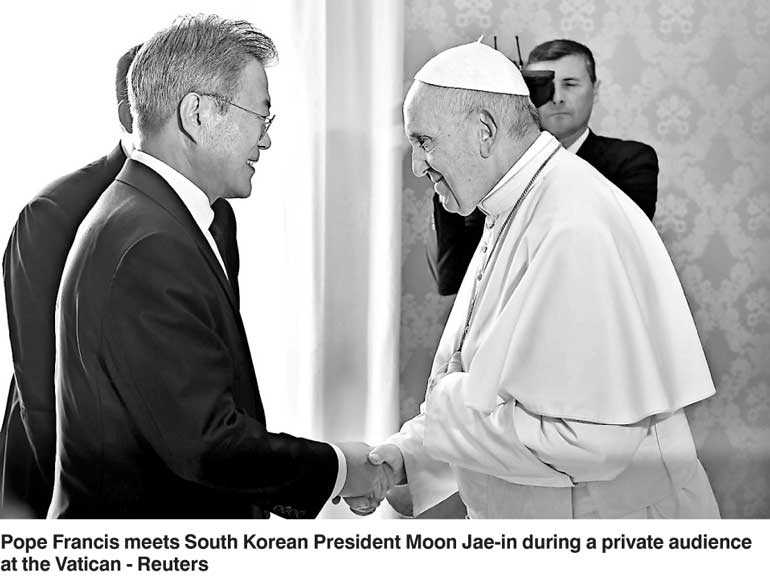Tuesday Feb 17, 2026
Tuesday Feb 17, 2026
Saturday, 20 October 2018 00:10 - - {{hitsCtrl.values.hits}}

VATICAN CITY (Reuters): Pope Francis on Thursday received an invitation to visit North Korea and the pontiff indicated he would consider making what would be a landmark trip to a nation known for severe restrictions on religious practice, according to South Korean officials.
South Korean President Moon Jae-in relayed the invitation from North Korean leader Kim Jong Un to the pope verbally during a 35-minute meeting in the Vatican.
Any visit would be the first by a pope to the reclusive state which does not allow priests to be permanently stationed there. There is little information on how many of its citizens are Catholic, or how they practice their faith.
North Korea’s constitution guarantees freedom of religion as long as it does not undermine the state.
But beyond a handful of state-controlled places of worship – including a Catholic church in the capital of Pyongyang - no open religious activity is allowed and the authorities have repeatedly jailed foreign missionaries.
Kim told Moon, a Catholic, of his wish to meet the pontiff during a meeting last month and the South Korean leader announced before the trip that he would be relaying a message..
According to the president’s office, Francis expressed his strong support for efforts to bring peace to the Korean peninsula. Moon’s office quoted the pope as telling Moon: “Do not stop, move forward. Do not be afraid.”
Asked if Kim should send a formal invitation, Moon’s office quoted the pope as responding to Moon: “your message is already sufficient but it would be good for him to send a formal invitation.”
“I will definitely answer if I get the invitation, and I can go,” the president’s office quoted the pope as saying.
A meeting with Pope Francis would be the latest in a string of major diplomatic meetings for Kim Jong Un this year.
The two Koreas have held three summits this year. Kim also held an unprecedented summit with US President Donald Trump in Singapore in June, where the leaders promised to work toward denuclearisation of the Korean peninsula.
The pope is expected to visit neighbouring Japan next year and the proposed North Korea visit comes as China improves relations with the Holy See.
A deal signed in September gives the Vatican a long-sought say in the choice of bishops in China, and for the first time, Beijing allowed two bishops to attend a Vatican meeting, where they invited the pope to visit China.
A Vatican statement made no mention of the verbal invitation from North Korea’s Kim.
It spoke only of “the promotion of dialogue and reconciliation between Koreans” and “the common commitment to fostering all useful initiatives to overcome the tensions that still exist in the Korean Peninsula, in order to usher in a new season of peace and development.”
Any trip to the North, however brief, could be contentious for the pope, given what the United Nations says is a record of gross and systematic human rights abuses.
Church officials estimate that North Korea had a Catholic community of about 55,000 just before the 1950-53 Korean War.
Religious agencies have estimated the number remaining from the few hundreds to about 4,000.
Priests from the South occasionally visit, usually accompanying aid deliveries or humanitarian projects.